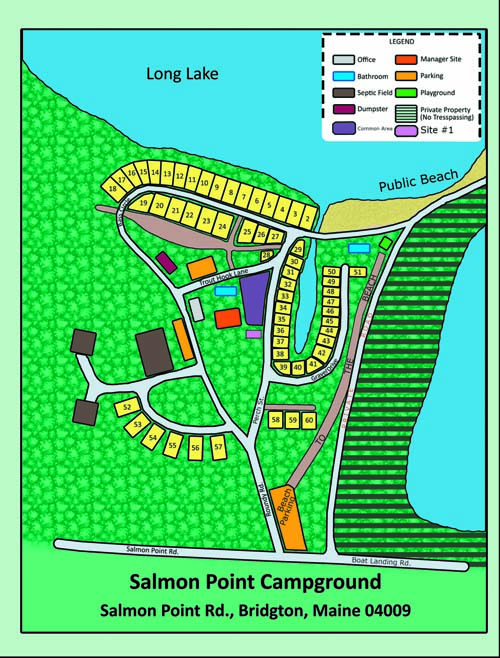Walk to Salmon Point beach solution reached

By Wayne E. Rivet
Staff Writer
Just in time for the summer season, the path from the public parking lot to Salmon Point has been legally cleared.
The Town of Bridgton and the residents of Salmon Point Road have reached a solution to resolve the pending litigation at Salmon Point Road.
The town has constructed a public footpath parallel to the private portion of Salmon Point Road, physically separated from the private way by a split-rail fence, that will offer safe access to the public beaches at Salmon Point from the available public parking.
In conjunction with the recently-finished public parking lot, the footpath is part of the Town of Bridgton’s ongoing commitment to improving access to public resources and protecting the historic use and rights of local residents as more people discover the allure and natural beauty of Bridgton’s beaches and lakes.
As shown in the accompanying illustration, the path extends from the public parking lot adjacent to Salmon Point Campground to the public beaches at Salmon Point and will be maintained by the Town of Bridgton for this purpose. Further, signage will be posted directing visitors to use the footpath.
The town completed the gravel path so that visitors can safely access the public beaches and Salmon Point. In addition, new signage will be erected by the Town of Bridgton identifying the private portion of Salmon Point Road as a Private Way. While the two pre-existing handicapped spaces at Salmon Point will be maintained, the use of the private portion of Salmon Point Road will be limited to licensed or placarded handicap vehicles.
In a joint statement, both the residents of Salmon Point Road and the Town of Bridgton stated that “the agreement strikes a well-measured balance between providing access to the public facilities at Salmon Point while preserving the historic use of Salmon Point Road by local residents. We are happy to have been able to come up with an amicable solution that will increase the safety, accessibility and beauty of Bridgton’s public spaces for years to come.”
The confrontation
The confrontation between the town and private property owner Carol Martini started in August 2018, when a path from a newly-constructed public parking area at Salmon Point led beachgoers to Salmon Point Road — a private way — to access the public swimming area.
In a two-count lawsuit filed in Superior Court in Portland, Martini (who purchased her Long Lake parcel in September 1989) contended that Salmon Point Road is a private way and that the Town of Bridgton had no legal right of access. Martini sought the court to require the town to cease all actions that direct traffic over the private way, require the town to remove all points and cause for access over Martini’s property, and require the town to compensate Martini for attorney fees and costs.
The second count claimed continued use of Martini’s property constituted an illegal and ongoing trespass, which has caused Martini harm, and such interference had caused a reduction in property value and her inability to enjoy the land.
Bridgton selectmen approved withdrawing $15,000 from the Salmon Point Unassigned Fund Balance to defend the town. Costs included a survey, which by Sawyer Engineering & Surveying Inc. of Bridgton (estimated cost of services, $3,550), and legal fees.
The town argued:
• The town holds a statutory private right-of-way over the road segment. This private right expires only if the subdivision roads are not built within 20 years from the date of recording of the subdivision plan, otherwise the private right-of-way over the roads exists in perpetuity. In this case, the road segment was constructed within 20 years of the date of recording of the subdivision plan.
• The town holds a deeded right to traverse the portion of the road segment between the campground lot and the Salmon Point lot.
• The town holds an implied easement over the road segment. Maine courts have recognized that easements not specifically described and granted in the instruments of conveyance may be implied by the circumstances surrounding the property.
• The public has a common law right of pedestrian access to Long Lake. Consequently, the Law Court has held that the Maine common law, interpreted according to the terms of the Colonial Ordinance’s grant, vests in the public right to cross privately-owned land to access a great pond.
• The town and the public have not overburdened the road segment.
The brief also said Counts 2 and 3 brought by Martini are barred by the town’s immunity under the Maine Tort Claims Act.

